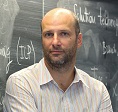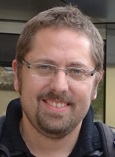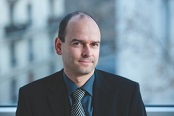
|
|
|
Tutorials
4 TUTORIALS
Tutorial 1 : Swarm Intelligence in Optimization By Dr. Christian Blum, University of the Basque Country in San Sebastian (Spain)
Abstract : The field of swarm intelligence (SI) is concerned with the design of intelligent multiagent systems inspired by the collective behavior of social insects (ants, termites, bees and wasps) and other animal societies such as flocks of birds or fish schools. The mechanisms that govern the behavior of these societies has remained unknown for a long time. Even though the single society members are non-sophisticated individuals, they are able to achieve complex tasks in cooperation. Coordinated behavior emerges from relatively simple actions or interactions between the individual members. Optimization techniques based on swarm intelligence have become increasingly popular during the last decade. They are characterized by functioning in a decentralized way, mimicing behaviors found in nature. The advantage of these approaches over traditional techniques is, generally speaking, their robustness and flexibility. These properties make swarm intelligence a successful algorithm design paradigm in order to cope with increasingly complex problems. After a general introduction, this tutorial will first focus on well-known swarm intelligence techniques for optimization in centralized settings. Examples concern ant colony optimization, particle swarm optimization, and optimization techniques based on the behavior of honey bees. Moreover, the tutorial will cover some recent examples of swarm intelligence techniques for optimization in de-centralized settings. Examples are the self-organized (de-)synchronization that is found in ant colonies and certain species of frogs. Biography: Christian Blum currently holds the permanent position of an Ikerbasque Research Professor at the University of the Basque Country in San Sebastian (Spain). He received the doctoral degree in 2004 from the Free University of Brussels (Belgium). Subject of his research is the use of swarm intelligence techniques for optimization in centralized and de-centralized settings, as well as the hybridization of metaheuristics with more classical artificial intelligence and operations research methods. In the context of these research lines he has published more than 100 papers in journals and conference proceedings. He is a member of the editorial boards of international journals such as Computers & Operations Research, Applied Soft Computing, Neural Computing & Applications and Computer Science Review. As a co-founder, he initiated the series of International Workshops on Hybrid Metaheuristics (HM). Finally, he presented invited tutorials at conferences such as PPSN, GECCO, ICARIS and HIS, and keynote talks at international conferences such as ANTS, BIOMA and OPTMAS.
Tutorial 2 : Enlarging the Paradigm of Ant Algorithms Dr. Eng. Nicolas Zufferey, Professor at the Geneva School of Economics and Management GSEM – University of Geneva, Switzerland
Abstract : Ant algorithms are well-known metaheuristics which have been widely studied since two decades. The recent evolution of such methods could be roughly characterized with the following sentence: “Ant colony optimization: from cumbersome and inefficient constructive algorithms to aggressive powerful techniques”. In classical ant algorithms, the role of each ant is to build a solution in a constructive way, where each decision is based on a tradeoff between the greedy force and the trail system. The greedy force (also called visibility or heuristic information) represents the self-adaptation ability of an ant. The trail system represents the collaboration ability of the ants: it is usually a central memory containing relevant information on the history of the search process. Other types of ant algorithms have recently emerged out of the common framework of the constructive ant algorithms. On the one hand, different roles are designed for each individual ant, ranging from a negligible help in the decision process to a refined local search method. On the other hand, different ways to select a decision are proposed, which outperform the standard tradeoff between the greedy force and the trail system. The goal of this talk is to classify and benchmark the unconventional ant algorithms, as well as to highlight their successful elements. Numerical experiments will be presented for problems in the following fields: graph coloring, production scheduling, and location-distribution problems. Moreover, various criteria (e.g., quality, speed, robustness, ease of adaptation, ability to take advantage of the problem structure) will be used to measure the performance of the methods. Biography: Nicolas Zufferey is a full professor of operations management at the University of Geneva in Switzerland. His research activities are focused on designing metaheuristics for difficult and large combinatorial optimization problems, with applications mainly in transportation, scheduling, production, inventory management, network design, and telecommunications. He is member of the CIRRELT transportation and logistics research center (www.cirrelt.ca) and of the GERAD decision analysis research center (www.gerad.ca). He received his BSc and MSc degrees in Mathematics at EPFL (the Swiss Federal Institute of Technology in Lausanne), as well as his PhD degree in operations research (2002). He was then successively a post-doctoral trainee at the University of Calgary (2003 – 2004) and an assistant professor at Laval University (2004 – 2007). He is the (co)author of more than 60 publications (papers in professional journals, proceedings of conferences, and book chapters) and has reviewed papers for more than 30 international journals. He has had research activities with about 15 Universities in Europe and North America, as well as with about 10 private companies.
Tutorial 3 : Performance Variability in Mixed-Integer Programming and its Effect in Benchmarking
Prof. Andrea Lodi (University of Bologna, Italy)
 Abstract : The performance of Mixed-Integer Programming solvers is subject to some unexpected variability that appears, for example, when changing from one computing platform to another, when permuting rows and/or columns of a model, when adding seemingly neutral changes to the solution process, etc. This phenomenon has been observed for decades but only recently it started to be methodologically analyzed with the two possible aims of either reducing or exploiting it, ideally both.
In this tutorial we discuss the roots of performance variability, we provide useful tips to recognize it, and we point out some severe misinterpretations that might be generated by not performing/analyzing benchmark results carefully. Finally, we report on the most recent attempts to gain from variability.
Biography: Andrea Lodi received the PhD in System Engineering from the University of Bologna (2000) and he has been Herman Goldstine Fellow at the IBM TJ Watson (2005-2006). He is Full Professor of Operations Research at DEI, University of Bologna since 2007. Andrea Lodi main research interests are in Mixed-Integer Linear and Nonlinear Programming. He is author of many publications in top journals of Mathematical Programming, and he serves as Associated Editor for several of them. He is network coordinator of the EU projects FP7-PEOPLE-2012-ITN and ICT-COST-ACTION-TD1207, and, since 2006, consultant of the IBM CPLEX R&D team.
Tutorial 4 : The Clonal Selection Paradigm for Optimization in Continuous and Discrete Search Spaces
Dr. Mario Pavone (University of Catania, Italy)
 Abstract : The Immune System represents a highly parallel and distributed adaptive system composed of a diverse range of adaptive immune agents dedicated to protect organisms from infection (like viruses, bacteria, fungi and parasites) that can be cause of diseases. These immune agents form a complex and dynamic network, which through learning, memory, and associative retrieval are able to perform distributed cognitive tasks, as well as solve recognition and classification tasks. These remarkable information-processing abilities of the natural immune system provide important aspects in the field of computation. Artificial Immune Systems (AIS) represent a mature research area that bridges the disciplines of immunology, biology, medical science, computer science, physics, mathematics and engineering. The aim of AIS ranges from modelling and simulation of the immune system through to immune-inspired algorithms in silico, in vitro and in vivo solutions. In recent years, algorithms inspired by theoretical immunology have been applied to a wide variety of domains, and the theoretical insight into aspects of artificial and real immune systems have been sought through mathematical and computational modelling, and analysis. This tutorial, after an introduction, and an overview on the AIS field, including some immunological background, and different immune approaches, it will focus on the clonal selection algorithms, a special class of AIS, which are based on the simulation of the natural clonal selection principle, and represent an effective mechanism for searching and optimization. Such algorithms have been successfully employed in a variety of different application areas. Afterwards, in the last part, it will be presented, and described a CSA, which has been successfully applied either in continuous and discrete domains.
Biography: Mario Pavone is an assistant professor in computational intelligence at the Department of Mathematics and Computer Science of the University of Catania. His research is focused on the design and develops of artificial immune systems, and more generally of nature-inspired algorithms, for optimization tasks, which have been applied on several research areas, as combinatorial, numerical, and systems biology problems. He is member of the editorial boards of international journals, and he is also member of many program committees. He has been guest editor for several special issues, published in Natural Computing and Memetic Computing journals. He has been chair of several international conferences and workshops, such as NICSO 2007, ICARIS 2012, PPSN 2012 and ECAL 2013. Today, he is director of the Synthetic and Systems Biology Summer School (SSBSS 2014), and chair for the first international workshop on AIS (Systems Immunology, Computational Immunology and Immune-Inspired Engineering) 2015, and Hybrid Metaheuristics 2016. He is also co-founder of TaoScience Research center. Since April 2014, he has been nominated chair of the task force on artificial immune systems for the IEEE Computational Intelligence Society (IEEE CIS).
|
| Online user: 1 | RSS Feed |

|


